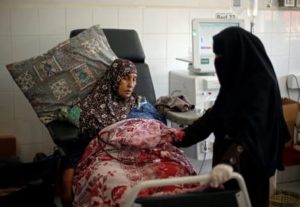Imagine that the Interior Ministry prohibits your relative from receiving essential medical care in Tel Aviv, because you – contrary to the policies of increasing the Jewish population in the outlying areas and separating ethnic communities – moved there from your hometown, where you could not find a decent job. Hard to picture such ill will, right?
But that’s what Israel habitually does to patients from the Gaza Strip: If they have a relative who has moved out of Gaza to live and work in Ramallah, in the West Bank, for example, Israel prohibits them from leaving Gaza for essential medical care not available in Gaza. It conditions granting them an exit permit for medical treatment on the relative in Ramallah first returning to live in the Strip.
You will certainly protest vehemently that it’s not the same thing. Only a Jew really feels the pain of his sick sister when she received unsuitable treatment or no treatment at all. Arabs in the same situation don’t feel pain. An Arab mother doesn’t suffer like a Jewish mother, if some bureaucratic obstacle prevents her teenage daughter from undergoing the tests she needs.
For example, 15-year-old Asmaa. She suffers from thrombosis. Prof. Raphael Walden, a blood-vessel expert, explains that this is a serious, life-threatening illness that cannot be properly treated by the Palestinian healthcare system. The problem is that Asmaa has two brothers living in the West Bank. Her request to leave Gaza for tests in Ichilov Hospital in Tel Aviv was denied because, as a well-tamed officer/clerk – from the Gaza District Coordination and Liaison office, which is part of the Civil Administration, under the authority of the Coordinator of Government Activities in the Territories, which is a unit in the Defense Ministry – explained: “Until her brothers return to the Strip, we cannot approve her.”
The same thing happened to Ulfat, 33, a mother of four, who had an appointment at St. John’s Hospital in East Jerusalem, after all the treatments she had received for her ear infections had failed. It turned out that the husband of one of her sisters lives in the West Bank. Very serious.
The ban imposed by the Israeli bureaucracy does not skip over a person whose nephew committed the anti-Semitic crime of going to live where he could find a livelihood. Like Abed Al-Hakim, 61, father of 11. Problems with his eyes caused his vision to decline badly. He was set to undergo surgery at St. Joseph’s Hospital in East Jerusalem. But his application for an exit permit was turned down because one of his nephews lives in the West Bank. What was the older man liable to do? Sneak into Ramallah after his surgery and work with his nephew at a construction site, or a restaurant?
And so on and so forth, the cases are piling up. As I wrote here a few months ago, over the past two years the excuse “relative living in the West Bank” has been used as a pretext to prohibit a patient from leaving the Gaza Strip for treatment.
The authorities cite “concern over illegal residence in Judea and Samaria.” I do not recognize the legality of this definition: It is the right of a Palestinian from Gaza who travels to the West Bank to stay there, just as it is the right of a woman from Netivot to move to Ramat Gan and the right of a resident of Nahariya to move to Bnei Brak.
In 2018, up to October 23, 433 people were turned down using this excuse. In 2017, the number was 379. That was the response of the Coordinator of Government Activities in the Territories to a request for the data from Physicians for Human Rights.
So what do we learn? First, that Israel is constantly improving its means of control. Each time it crosses a new red line in its cruelty. Second, Israel has added means of collective punishment to an offense it invented (the residence of a Palestinian from Gaza among his or her people in the West Bank): There is no medical treatment for relatives of the offender, until that person moves back to the Gaza Strip. Third, and this is related: Cutting off the Strip from the West Bank (what Israel calls segregation) is important to Israel as a key part of its policy. Who remembers that Israel signed a declaration recognizing that the West Bank and the Gaza Strip are a single territorial unit? Fourth: There is no need to go so far as Istanbul, Brussels and Dublin to find natives of the unemployment-plagued, fenced-in Gaza Strip, which they left in some unlikely way, and who are looking for any job they can find on the outside. You can see them in Ramallah and Bethlehem.
The all-powerful Israeli regime classifies them as “illegal residents.” They might be caught by a well-tamed soldier obeying orders and be expelled, so they try not to leave the Palestinian checkpoint-surrounded enclave where they stay. They live 70 kilometers away from their families, including wives and children, and don’t see them for years. Some suffer from loneliness because, how to put this delicately, Palestinian society in the West Bank is not always welcoming to Gazans. And then, they might hear that their mother who has a kidney ailment can’t leave for the treatment she needs until they go back.
Gaza’s Al Mezan Center for Human Rights and Tel Aviv’s Physicians for Human Rights filed a High Court of Justice petition to abolish the conditioning of medical treatment on the return of a relative to Gaza. The writers of the petition, attorneys Adi Lustigman, Tamir Blank and Hagar Shechter, are waiting for the state’s response.
This article is published in its entirety.

